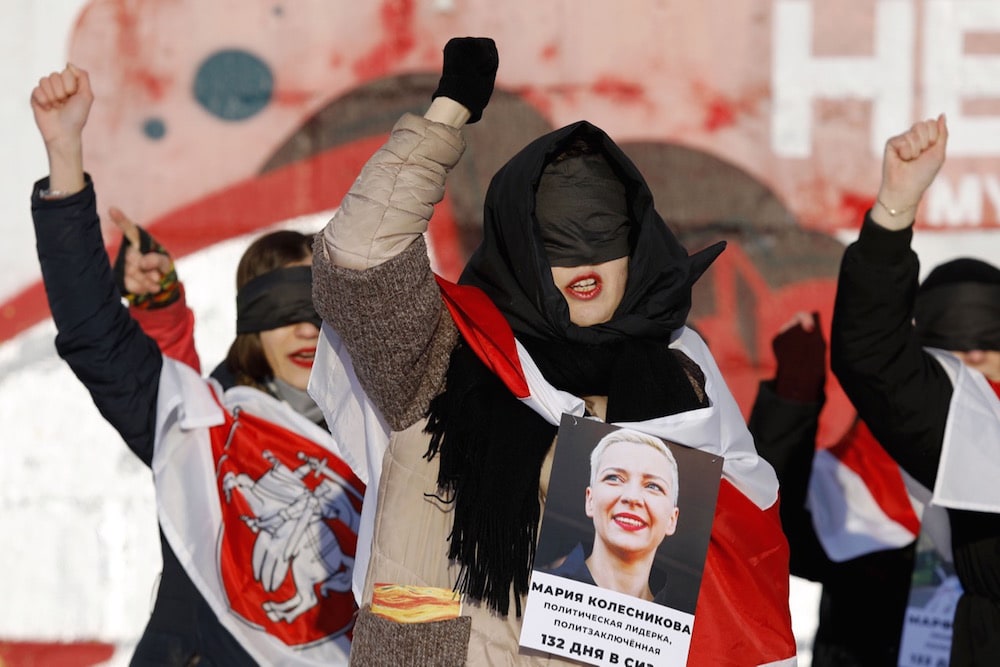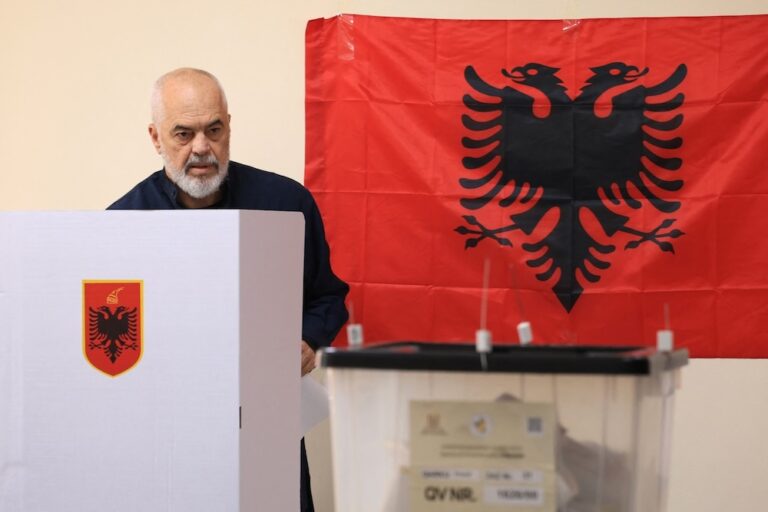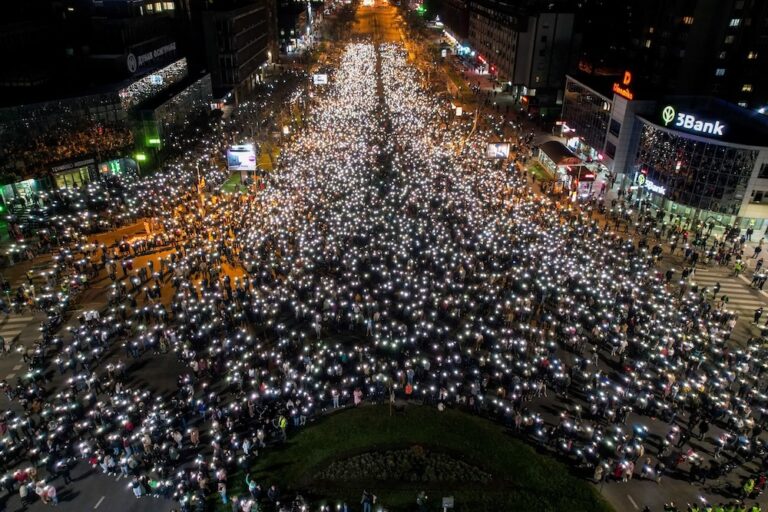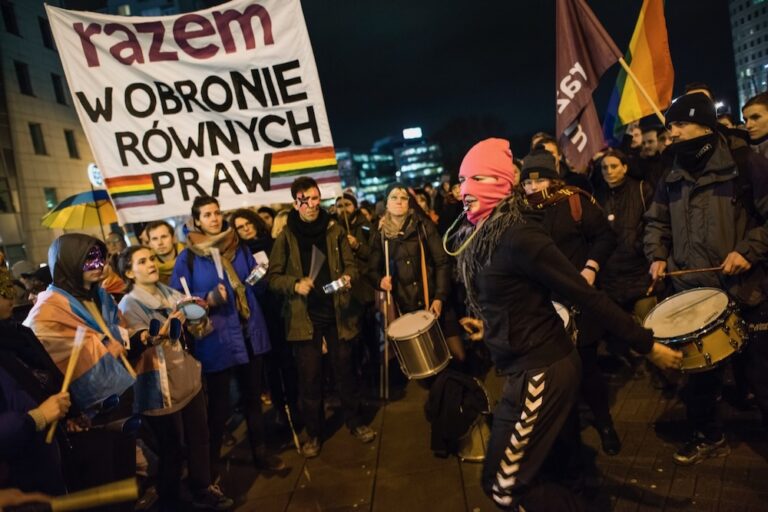May 2022 in Europe and Central Asia: A free expression round up produced by IFEX's Regional Editor Cathal Sheerin, based on IFEX member reports and news from the region.
New death penalty legislation has disturbing implications for opposition voices in Belarus; Russian forces commit 280 crimes against Ukrainian media; LGBTQI+ and civic space in Europe; Turkey sees new draconian disinformation bill introduced and an uptick in attacks on artistic freedom.
The prospect of being shot for daring to speak out
On the International Day of Solidarity with Belarus (29 May), human rights advocates around the world showed their solidarity with the Belarusian people by calling for an end to President Lukashenka’s repression of the independent press and civil society, and for all political prisoners (there are currently 1,217) to be freed.
May saw a number of disturbing developments, the most alarming of which was the widening of the application of the death penalty to include ‘attempted terrorism’. Rights advocates condemned the move, pointing to the vagueness of the Belarusian authorities’ definition of ‘terrorism’ and the frequency with which they have used “terrorism-related charges to prosecute political dissent”. As Amnesty International said, “opponents of the government now face the prospect of being shot if they dare to speak out”.
The implications of this for Belarus’s opposition leaders are worrying: Maryia Kalesnikava (currently in prison) and Sviatlana Tsikhanouskaya (currently in exile) are both on the KGB’s list of ‘terrorists’.
Also smeared as terrorists are exiled journalists Stsiapan Putsila and Yan Rudzik, who (it was reported this month) have been charged with “organisation and management of a terrorist organisation”. The charges are based on their work at NEXTA, an opposition Telegram channel that helped coordinate the anti-Lukashenka protests of 2020. NEXTA was founded by Putsila.
Sofia Sapega, arrested in May 2021 alongside former NEXTA editor Raman Pratasevich after the Belarusian authorities forced their flight to land in Minsk, was sentenced to six years in prison this month. She was convicted of ‘inciting social enmity and discord’ and ‘illegally collecting and disseminating information about the private life of an unnamed person without his consent’. Pratasevich is yet to go on trial and the status of the investigation against him is not clear.
The trials of several journalists are expected to begin in June, including that of former BelaPAN deputy director Andrei Aliaksandrau, who is facing numerous charges including tax evasion, participation in an extremist organisation and treason. Aliaksandrau, who previously worked at Index on Censorship and ARTICLE 19, faces 15 years in prison if convicted.
280 crimes committed against the Ukrainian press
As Reporters Without Borders (RSF) reminded us this month, the list of journalists who are victims of Russia’s war against Ukraine grows longer by the day.
According to RSF, seven journalists have been killed and 12 injured by gunfire since Russia invaded its neighbour on 24 February. IFEX’s Ukrainian member, the Institute of Mass Information (IMI), has recorded 280 crimes committed by Russia against the media and journalists in Ukraine in the first three months of the war.
Among those targeted by Russian forces is Crimea-based journalist Iryna Danilovich, who went missing in April and was located in a Russian FSB pre-detention centre in Simferopol in May. The Committee to Protect Journalists (CPJ) reports that Danilovich has been ill-treated in detention and that she has been charged with illegally handling explosives, for which she faces up to eight years in prison if convicted.
Another media worker targeted this month was IMI’s media expert Iryna Zemlyana. She was doxxed on Russian Telegram channels and received several threats to rape and kill her after she doused the Russian Ambassador to Poland, Serhiy Andreev, with fake blood at an anti-war rally in Warsaw. Zemlyana eventually had to leave Warsaw to protect her safety.
IFEX members continue to provide practical support to Ukrainian journalists and media (for a full list of their initiatives see our March brief). This month, RSF and IMI opened a second Press Freedom Centre in Ukraine to support journalists by providing safety equipment and training, and psychological support.
According to the UN, Russia’s attack on Ukraine has claimed approximately 4,000 civilian lives so far and forced 6,737,208 refugees to flee the country. Evidence that Russian troops have committed war crimes increases almost daily, with – as Human Rights Watch reports – credible testimony that civilians have been subjected to summary executions, torture and unlawful confinement.
LGBTQI+ and civic space
Marking this year’s International Day Against Homophobia, Transphobia, Biphobia and Intersexphobia (IDAHOBIT) (17 May), ILGA-Europe published its Rainbow Europe Map and Index. This annual report reviews the legal and policy situation for LGBTQI+ people across Europe over the previous 12 months and ranks countries accordingly. It provides an overview of the degree to which LGBTQI+ people can access their rights and fully engage in civic space.
The report presents a mixed picture: there was “a severe rise in 2021 of anti-LGBTQI+ rhetoric from politicians and other leaders, which has fuelled a wave of violence… [but] the response to this has been an allied determination in many countries, and at the European level, to tackle hatred and exclusion of LGBTQI+ people”.
This year’s five best-performing countries in terms of LGBTQI+ rights were (in order, from 1-5): Malta, Denmark, Belgium, Norway and Luxembourg. There were promising developments in several other countries which, according to ILGA-Europe, “chose to take real action over the past 12 months to progress LGBTQI+ equality”. These include France, which banned the dangerous and evidence-free practice known as ‘conversion therapy’, and Iceland, which introduced legislative recognition of trans parenthood.
The worst-performing country in the EU was, unsurprisingly, Poland, whose government has for years openly promoted homophobia – including so-called ‘LGBT-free zones’. Although some regional authorities have dropped their ‘LGBT-free zone’ declarations (following a threatened loss of EU funding, or after court rulings against them), lawmakers voted in late 2021 to continue work on legislation popularly known as ‘Stop LGBT’, which seeks to ban pride parades and other public actions considered to ‘promote’ same-sex relationships.
Romania, Bulgaria and Hungary were not too far behind Poland in the official promotion of anti-LGBTQI+ sentiment. Only last month, on the day of the general election, Hungary’s ruling party held a referendum asking voters to validate anti-LGBTQI+ legislation introduced in 2021 that prohibits the ‘portrayal and the promotion of gender identity different from sex at birth, the change of sex and homosexuality’. However, following a campaign led by NGOs, 1.6 million people deliberately spoiled their ballots and the referendum was declared invalid.
The worst countries overall for LGBTQI+ people were (in order, from 45-49): Belarus, Russia, Armenia, Turkey and Azerbaijan.
Notably, Turkey’s position in ILGA-Europe’s ranking has been dropping steadily since 2015. Among the concerning trends noted by ILGA-Europe were the promotion of homophobic sentiment by leading politicians, frequent bans on pride events (and their often violent dispersal by the police), the harassment of trans sex workers by law enforcement and the “countless hate crimes” against LGBTQI+ people. As if to confirm the findings of the report, May 2022 saw the police beat and detain approximately 45 individuals at the Boğaziçi University Pride march, and also the distribution – apparently by religious extremists – of leaflets calling for the “stoning to death” of LGBTQI+ people in the city of Eskişehir (usually regarded as a safe space by Turkey’s LGBTQI+ community).
“Boosting systematic censorship and self-censorship”
Last year, Turkey’s President Erdoğan described social media as one of the main threats to democracy and promised legislation that would criminalise the dissemination of disinformation online. This month saw the ruling party and nationalist allies present a long-anticipated (and dreaded) ‘disinformation bill’ to parliament. If the bill becomes law, those convicted under it will face up to three years in prison for spreading ‘fake news’ on the internet.
Journalists’ groups, including the International Press Institute (IPI), have called for the withdrawal of the bill, arguing that it will “boost systematic censorship and self-censorship” rather than tackle disinformation. The vagueness of the language in the bill, they say, leaves the legislation “open to gross abuse by a judicial system that is already suffering from political capture and a loss of independence”.
As IPI states in its recent report, Turkey: Spectre of a Digital Lockdown, the disinformation bill is another attempt by the ruling party to “cement control over one of the last spaces for free journalism remaining in Turkey”.
The bill is a continuation of the kind of policy-making that introduced new rules in 2020 requiring all social media platforms to establish legal entities in Turkey or face tough sanctions. That move was intended to make these platforms more responsive to government takedown requests.
Artists hit by wave of cancellations and bans
Although we are used to regular reports about the continuing persecution of independent journalists in Turkey, the targeting of artists or the curbing of artistic expression hits the headlines only infrequently. This month, IFEX member Bianet published several stories charting an apparent uptick in the ongoing censorship of singers, actors and other performers by the Turkish authorities.
Dozens of concerts and other artistic events have been cancelled or banned over the last three years – many of them featuring Kurdish or Armenian musicians. Some performers have also been arrested, jailed, beaten or harassed. May 2022 alone saw local administrations cancel several events, including concerts by Kurdish singer Aynur Doğan and musicians Metin and Kemal Kahraman, and also a performance of Don Kîxot, a Kurdish adaptation of Cervantes’s Don Quijote.
Often, no clear reason is given for these cancellations; not infrequently they are explained away as merely being due to a ‘double-booking’. On some occasions, however, such as this month’s cancellation of all music performances at Middle East Technical University’s International Spring Festival, the reason offered is ‘public safety’. On other occasions, such as the ban on singer Melek Mosso’s concert (due to take place on 3 June at the International Isparta Rose Festival), the justification given is ‘public morality’. Sometimes the reasoning is blatantly political and due to an artist’s activism or support of an opposition party.
Responding to the recent spate of bans and cancellations, 57 Turkish bar associations issued a joint statement in late May condemning the trend, arguing that “these decisions are given with discriminatory, arbitrary and political motives against the mother tongue, culture, way of life and genders”.



